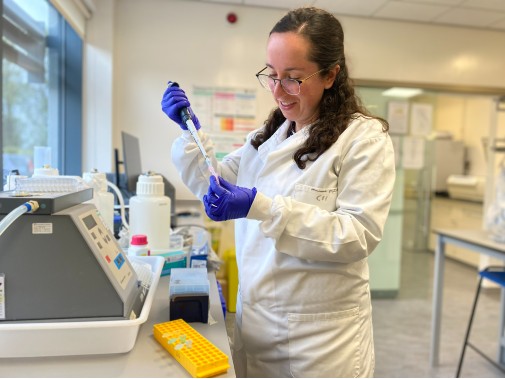Early Career Researcher Spotlight - Dr Alyssa Cull
Dr Alyssa Cull is a postdoctoral researcher in Professor Dave Kent’s lab, at the Centre for Blood Research (CBR). Hear more about her journey in academia so far, and how the CBR is contributing to her future as a blood cancer researcher.

Tell us about your PhD
I did my PhD at Queen’s University in Canada with Dr. Michael Rauh who is a fantastic clinician-scientist. My doctoral studies focused on understanding how mutations in a gene called Tet2 affect immune cells such as macrophages. We were able to show that mutant macrophages are pro-inflammatory and most likely contribute to the inflammation often seen in the early stages of leukaemia.
How did you end up working in your area of research? What’s your journey so far?
My interest in studying cancer initially came from watching family members struggle with cancer diagnoses and treatments. These experiences made me want to understand where cancer cells come from and why outcomes are so varied for people diagnosed with the same disease. Initially, I started out studying breast cancer but soon I became intrigued by blood cancers as the field of leukaemia research was rapidly evolving when I started my PhD. I think my research interests were truly cemented in the middle of my studies when my grandfather was suddenly diagnosed with the pre-leukemic condition I was studying (myelodysplastic syndrome). My family experienced first-hand the limitations of current therapeutic strategies as for the most part, very little can be done for older patients outside of treating acute symptoms. My grandfather’s struggle with frailty and illness in his final years has kept me focused on doing research that will hopefully shed light on why people develop blood cancers.
What does your current research look at?
Over the past few years, my research has been largely focused on understanding leukaemia risk in people with diseases such as sickle cell disease (SCD). I’ve been working on an exciting project along with clinicians and researchers from Boston Children’s Hospital and the Wellcome Sanger Institute to find out if we can detect cancer-related mutations before and after SCD gene therapy treatment. The second stage of this highly collaborative project now involves scientists from the UK, the USA, Tanzania and Uganda. In addition to this work, I am now focusing more of my time on building up the resources to start my own lab group which will be focused on understanding how immune cells impact blood cancer risk and development.
What do you love about your work?
I love that this job gives us the space and opportunity to dream big and tackle some of the holes in our fundamental understanding of human disease. I also thoroughly enjoy the variety that my work days bring and feel very privileged to be able to interact with a wonderful mixture of scientists at various career stages from all around the world. It really is the people around me who make the experience of doing research so incredibly rewarding.
At its core, the CBR is about bringing together people from various backgrounds and professions.
How has the CBR contributed to your current work?
I’ve always been very interested in doing research that can somehow be connected back to patients and the CBR is a great place to work in that respect. We’ve been actively building connections with amazing clinical partners such as Professor Sinisa Savic and Dr. Catherine Cargo, both of whom are based in Leeds. The CBR also brings us into contact with phenomenal epidemiologists like Professor Eve Roman and Professor Alex Smith at the University of York who have built the Haematological Malignancies Research Network (HMRN). This resource is unique in that we are able to mine clinical information on thousands of blood cancer patients within Yorkshire and this has helped us start various initiatives such as the BLOCK study which I have been involved in helping to set up.
What are your next steps/goals?
I’m at the stage where I’m working towards setting up my own research group which will specialise in studying immunity and blood cancer. My biggest goal at the moment is to get awarded funding to start this work.
If you think about the future of your area of research, how hopeful are you?
I’m very hopeful that within the next decade or two, new research-informed treatment strategies will become available to patients with blood cancers. When I look back to the experimental options we had when I first started my Masters degree, I can’t help but feel amazed at how far we have come in terms of techniques that we can use to answer our burning scientific questions.
How do you see the CBR supporting you to achieve these goals?
At its core, the CBR is about bringing together people from various backgrounds and professions. For me, being a scientist is about working alongside good people to unlock different pieces of the larger puzzle. In this environment, we’re constantly being exposed to different lines of thought and new ideas which only enriches the work that we’re all doing.
Read more about Alyssa's recent collaboration between with Boston Children’s Hospital, and the Wellcome Sanger Institute on the University's research news page. You can access the paper "Clonal selection of hematopoietic stem cells after gene therapy for sickle cell disease" published in Nature Medicine here. It was funded by the Bill and Melinda Gates Foundation. You can also read a press release on a new study at the CBR, where Alyssa and her colleagues are working with doctors and patients at York Hospital to understand the DNA mutations linked to a group of chronic blood cancers.